The "SEEC Effect"
Click here to read the full Data Brief
Members of the SEEC team have designed a conceptual model of the SEEC project's effect on engineering transfer students' retention and success. This model provides a visual representation of the many variables affecting the engineering transfer student.

The "SEEC Effect" can be extracted from the model for closer examination of the specific components of the SEEC project and their effect on the engineering transfer student.

Statistics drawn from Iowa State's Office of Admissions and Office of the Registrar and provided by Harry McMaken, SEEC project PI of Des Moines Area Community College show an increase in enrollment in key SEEC programs, E-APP, EGR 100, and Learning Communities. Students involved in these programs are retained at a higher rate than those who are not.
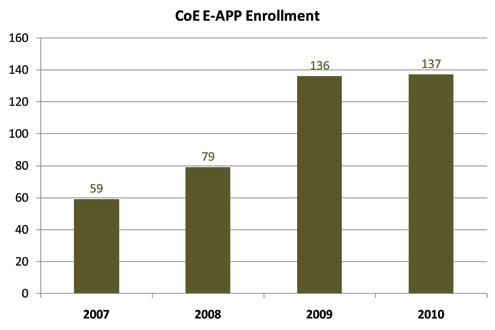
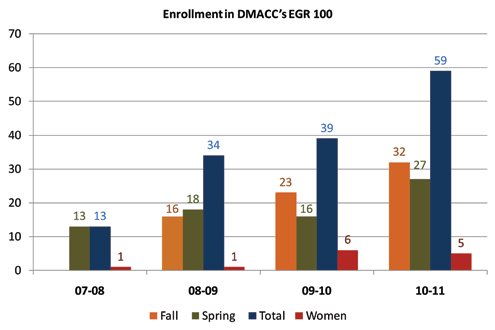
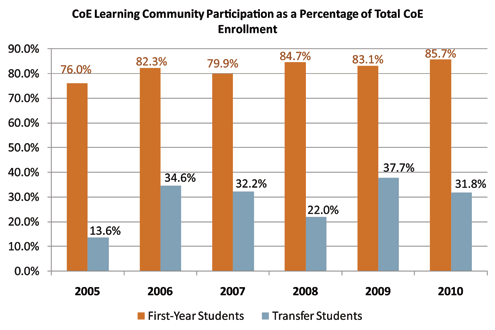
In addition to analyzing secondary institutional data, SEEC team members have designed the Engineering Transfer Student Questionnaire (E-TSQ) to gather primary data from engineering transfer students about their community college and Iowa State experiences. The E-TSQ collects information regarding the students' demographic backgrounds and community college and university experiences. It also asks a series of open-ended questions regarding these experiences. Survey data can then be linked to the students' academic transcripts to help researchers understand the connection between these experiences and the students' retention rates.
SEEC Team Presents
SEEC team members had several opportunities to present results of the SEEC project this quarter. These presentations meet the SEEC project's dissemination goal of sharing best practices with other institutions and at national meetings.
Student Success Summit, Ames, Iowa
SEEC team members presented posters as well as led several interactive sessions during this event.
NSF Division of Undergraduate Education (DUE) STEP Grantees Meeting, Washington D.C.
Assessing your STEP Project:Approach to Disentangling the Effects of Interwoven Project Strategies
Presented by Diane Rover, Frankie Santos Laanan, Steven Mickelson, and Mack Shelley.
The presentation showcased the SEEC Effect conceptual model as a framework to apply and analyze STEP projects. The E-TSQ was also highlighted as a tool that could be adapted for use with other STEP projects.
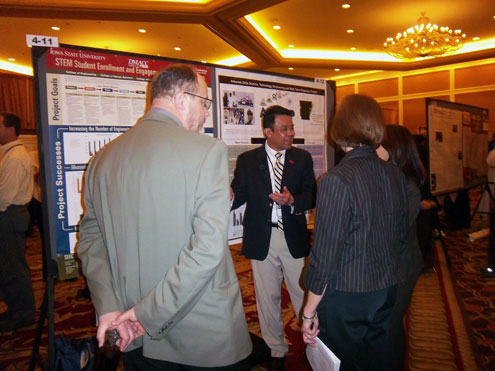
SEEC project team members present at the poster session.
Iowa Community College-ISU Academic Leader's Roundtable, Ames, Iowa
Overview of Research Activities
Presented by Frankie Santos Laanan, Larry Ebbers, and Linda Serra Hagedorn
AACRAO Conference, New Orleans, Louisiana
E-APP/APP as part of Best Practices in Degree Partnerships
Presented by Mary Darrow and Eric Merten
E:TEC Scholarship Program Grows
The E:TEC scholarship program has been growing and is now in its third year. Eighty-two incoming engineering students from 48 counties across Iowa were chosen to receive a one-time $500 merit-based scholarship. The following chart shows the growth in each measure from 2010 to 2011.
| E:TEC Scholarship Awards | 2011 | 2010 |
| Total Applications | 139 | 57 |
| Total Awards | 82 | 54 |
| Total Counties | 48 | 44 |
| Total Women | 25 | 7 |
| Total URM | 8 | 6 |
| Total Transfer | 16 | 3 |
The SEEC project partners with ISU Extension to help 4-H staff, educators, volunteers, parents and youth in each Iowa county increase their awareness and understanding of engineering. The growth in scholarship applications both in numbers and diversity indicates that the Engineering Talent in Every County (E:TEC) program is working.
CYSTEM Launched

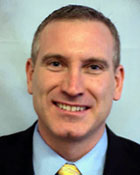 |
Michael Lentsch Director, Enrollment Management Des Moines Area Community College |
Connected!
"The SEEC project has helped us develop programs to build awareness of engineering as a career and show how DMACC's pre-engineering program connects to Iowa State's engineering program," explained Michael Lentsch, Director of Enrollment Management at Des Moines Area Community College. Discover Engineering Day is one such event. It targets high school students and their parents. Students attend interactive breakout sessions where they meet with professional engineers as well as pre-engineering student mentors to learn more about the field of engineering. Parents participate in a panel discussion that shows them how their child can create a pathway to an engineering career through DMACC and then on to Iowa State. Both students and parents visited with engineering professionals and Iowa State students in their respective display booths. Attendance at this event was up to 225, with about 125 being students and of those students, approximately 25 were female.
Explore Engineering Day targets current DMACC students with a similar structure and content. This year attendance was up to 57 students with 12 being women. A third program targets youth – specifically young girls. DMACC will host a STEM booth and breakout session at the Girl Scouts of Iowa's BIG (Believe in Girls) event. "These events also allow us to address the goal of attracting more women and minorities to engineering. We also have professional engineers and an Iowa State student who are part of these groups who help us reach out to women and minorities," said Lentsch.
"We have a good partnership with Iowa State. Especially over the past two years, it has really grown and become very productive," stated Lentsch. "Our connection to Iowa State lends us some 'instant credibility' with parents and even students. They recognize Iowa State's engineering program and we can show them how our pre-engineering program connects to that. It really helps them see that there is another pathway to an engineering career besides going straight to a four-year institution."
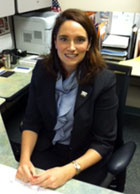 |
Kari Hensen Associate Dean, Arts & Sciences Des Moines Area Community College |
The SEEC project has many informal partners, and Kari Hensen, Associate Dean of Arts & Sciences at Des Moines Area Community College provides support and resources to the DMACC team members. From helping faculty members obtain needed engineering materials for their classroom to brainstorming ideas for increasing enrollment in pre-engineering, Hensen is active behind the scenes of the project. One of the larger SEEC project undertakings she was involved in was the design and implementation of a new physics lab at the DMACC's Hunziker Center in Ames.
Hensen recognizes that many of the SEEC project's outreach efforts, such as Discover Engineering Day, are working. Engineering Orientation (EGR 100) continues to grow and Hensen works with faculty and staff at DMACC's six campuses towards implementing sections of the class at each. This past fall the class was offered at the Boone campus. "The E-APP (Engineering Admissions Partnership Program) is also working very well. It gives us the opportunity to work closely with Iowa State and provide our students with a solid foundation to be prepared for their transfer," Hensen stated.
This spring she connected with Iowa State SEEC team members and traveled to the NSF STEP Grantees Meeting. "It was a great opportunity to discuss what we're doing well and what we can strengthen," said Hensen. She also noted that she took away ideas from other institutions. "We are all facing so many similar challenges. Having an opportunity to talk openly and candidly to discuss these is a very positive part of the SEEC experience," related Hensen.

